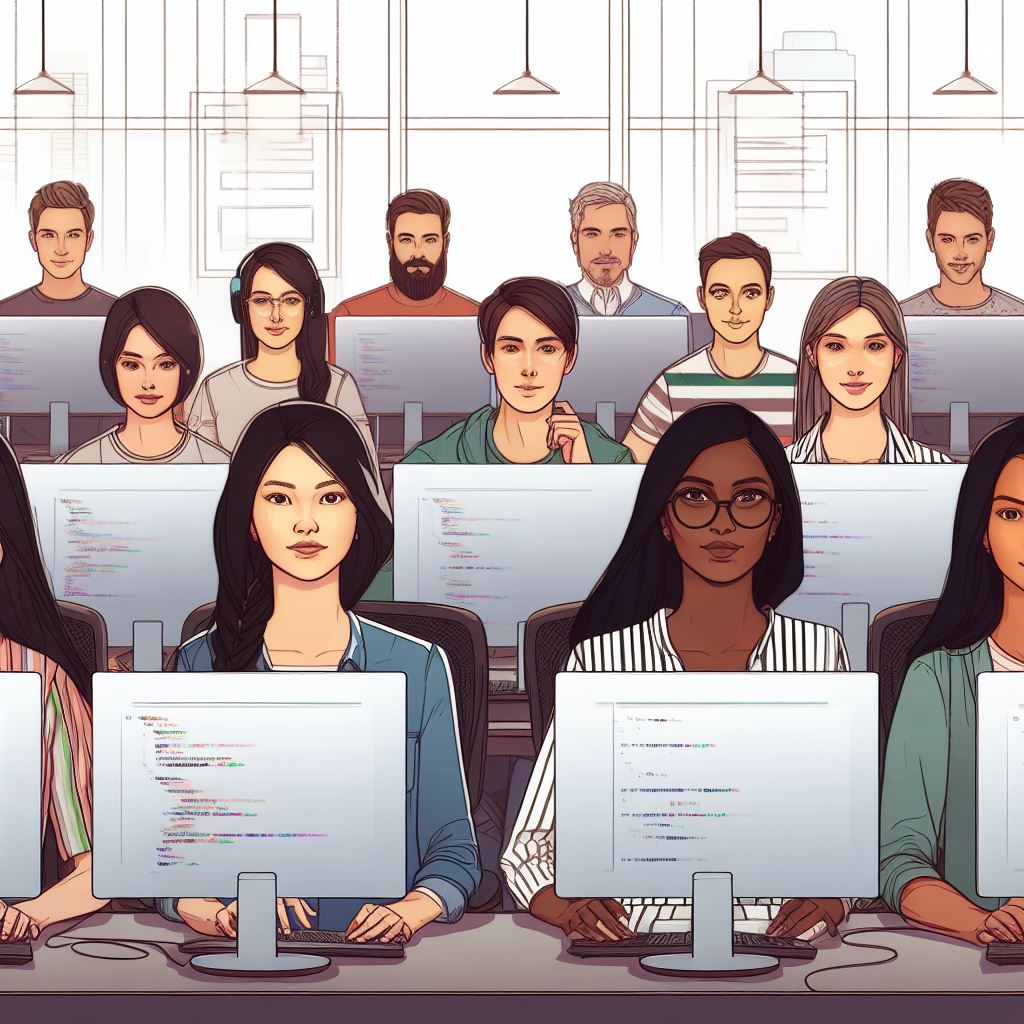Introduction
Technology has become an integral part of our lives, and coding and programming play a crucial role in its development.
Importance of coding and programming in the tech industry
Coding and programming are essential skills in the tech industry as they enable the creation of innovative software, applications, and websites.
The future of tech heavily relies on individuals who can navigate and manipulate code to build groundbreaking technologies.
Brief explanation of the topic and its relevance
The topic, “The Future of Tech: Where Coding Ends and Programming Begins,” explores the intersection between coding and programming.
Coding refers to the process of writing instructions in a specific programming language, while programming encompasses the broader aspect of creating algorithms and implementing solutions.
Understanding this distinction is crucial as it highlights the evolution of technology and the demand for specialized skills.
In today’s tech-driven world, coding is the foundation on which programming thrives.
However, with advancements in artificial intelligence and machine learning, programming is expanding beyond traditional coding practices.
This shift introduces the need for programmers who can develop complex algorithms and systems capable of machine learning and automation.
To remain relevant in the tech industry, individuals need to adapt to this ever-evolving landscape and embrace both coding and programming.
The future of tech is intricately linked to coding and programming.
As technology continues to advance, the role of programmers becomes increasingly vital.
By understanding the relationship between coding and programming, individuals can position themselves for success in the tech industry of tomorrow.
Defining coding: Understanding what coding is and its importance in the tech industry.
Definition of coding
- Coding is the process of creating instructions for computers to execute tasks.
- It involves writing lines of code, which are essentially sets of instructions.
- This process allows computers to understand and perform specific actions.
Application of coding in various fields:
- Software development: Coding is crucial for creating applications, websites, and computer software.
- Data analysis: Coding enables the processing and analysis of large volumes of data.
- Artificial intelligence: Coding helps in developing AI models and algorithms.
- Web development: Coding is essential for creating and maintaining websites and their functionality.
- Mobile app development: Coding is used to create mobile applications for different operating systems.
- Game development: Coding forms the foundation of game design and development.
- Robotics: Coding plays a vital role in programming robots and automation systems.
- Embedded systems: Coding allows for programming microcontrollers used in various devices.
Basic principles and concepts of coding:
- Variables: These are containers used to store and manipulate data during the coding process.
- Control flow: It determines the order in which instructions are executed in a program.
- Functions: They are reusable blocks of code that perform specific tasks.
- Data structures: These are organized formats used to store and manage collections of data.
- Algorithms: A set of step-by-step instructions used to solve specific problems or perform tasks.
- Debugging: The process of identifying and fixing errors or bugs in code.
- Object-oriented programming: A programming paradigm that focuses on creating objects and their interactions.
- Modularity: Breaking down code into smaller, manageable and reusable components.
- Abstraction: Simplifying complex systems by focusing on the essential details.
- Maintainability: Writing code that is easy to understand, update, and fix.
Coding is a critical skill in today’s tech-driven world, as it powers our digital ecosystem.
Read: Coding vs. Hacking: Understanding the Key Differences
Tech Consulting Tailored to Your Coding Journey
Get expert guidance in coding with a personalized consultation. Receive unique, actionable insights delivered in 1-3 business days.
Get StartedDefining programming
- Programming is the process of writing instructions for a computer to execute.
- It involves designing, coding, testing, and debugging software programs to solve specific problems.
- Programmers use programming languages to communicate instructions that a computer can understand and execute.
Definition of programming
- Programming is the art of creating sets of instructions, known as code, for computers to follow.
- It is a creative and problem-solving process that requires logical thinking and attention to detail.
- Programmers use programming languages to write code and develop applications, websites, and other software.
Relationship between coding and programming
- Coding is a subset of programming and refers to the act of writing code using programming languages.
- Programming involves a broader set of activities such as designing, planning, and testing.
- Coding is a crucial part of programming, but it is not the only aspect.
- Programming encompasses the entire process of creating software from start to finish.
Advanced concepts and techniques involved in programming
- Object-Oriented Programming (OOP) is a popular concept that allows programmers to create reusable code.
- Functional Programming focuses on using pure functions and immutable data structures.
- Concurrency and Parallelism enable programs to perform multiple tasks simultaneously.
- Algorithms and Data Structures help optimize program efficiency and solve complex problems.
- Design Patterns provide proven solutions to common programming challenges.
- Software Testing ensures the reliability and correctness of the program through systematic and automated tests.
- Version Control allows programmers to collaborate on projects and track changes made to the code.
Programmers play a crucial role in shaping the future of technology.
By mastering programming, individuals can develop innovative software, design intuitive user interfaces, and create cutting-edge applications.
Understanding the difference between coding and programming is essential for anyone interested in pursuing a career in tech.
Coding is the act of writing code, while programming encompasses a broader range of activities.
Programmers use programming languages to communicate instructions to computers and solve real-world problems.
However, programming goes beyond coding and involves designing, testing, and debugging software.
Read: Reddit’s Tips on Landing Your First Tech Job Post-Bootcamp
The Evolving Tech Landscape
The world of technology is constantly evolving, with new advancements being made at a rapid pace.
These advancements have revolutionized the way we live and work, and this trend shows no signs of slowing down.
One of the key areas that has seen significant progress is coding and programming.
As technology continues to advance, the line between coding and programming is becoming increasingly blurred.
However, there are still important distinctions to be made between the two.
Rapid Advancements in Technology
In recent years, we have witnessed groundbreaking developments in various technological fields.
From artificial intelligence and machine learning to virtual reality and the internet of things, these advancements have transformed the way we interact with technology.
These technologies have also had a profound impact on coding and programming. Traditional coding involved writing instructions for computers to follow.
However, with the rise of automation and AI, programming has become more about training algorithms and teaching machines how to learn.
Impact of Technology on Coding and Programming
Technology has made coding and programming more accessible to a wider audience.
Today, there are numerous tools and platforms available that simplify the coding process, allowing even those with no prior experience to create their own applications.
Additionally, the increasing integration of technology in various industries has created a higher demand for skilled coders and programmers.
Companies are now seeking professionals who can develop innovative solutions and adapt to the ever-changing tech landscape.
Increasing Demand for Skilled Coders and Programmers
As technology continues to advance, the demand for skilled coders and programmers is only expected to grow.
The ability to understand and work with complex algorithms and programming languages is becoming an essential skillset in many industries.
This increasing demand has also led to higher salaries and better career opportunities for those in the coding and programming field.
Companies are willing to invest in top talent to ensure they can stay ahead in the highly competitive tech industry.
The future of tech is full of exciting possibilities as advancements in technology reshape the coding and programming landscape.
The need for skilled coders and programmers will continue to rise, offering abundant opportunities for those who are willing to adapt and learn.
It is crucial for individuals interested in pursuing a career in coding or programming to stay updated with the latest trends and technologies.
Continual learning and honing of skills will be essential for success in this fast-paced and ever-evolving field.
Read: Ethical Hacking 101: An Introduction to Penetration Testing
Build Your Vision, Perfectly Tailored
Get a custom-built website or application that matches your vision and needs. Stand out from the crowd with a solution designed just for you—professional, scalable, and seamless.
Get Started
The future of coding
The future of coding is rapidly evolving as automation and artificial intelligence become prevalent in the industry.
These advancements have the potential to revolutionize the way we code and program.
Automation and artificial intelligence in coding
Automation and artificial intelligence have already started making their way into the world of coding.
Tools and software are being developed to automatically generate code based on specific requirements and patterns.
This reduces the need for manual coding, saving time and effort for developers.
Artificial intelligence is also being used to improve the efficiency of coding. Machine learning algorithms can analyze large amounts of code and identify patterns or errors.
This allows developers to quickly identify and fix bugs, resulting in faster and more reliable software development.
Role of coding in problem-solving
However, the role of coding in problem-solving cannot be undermined.
While automation and artificial intelligence can assist in generating code, the ability to think critically and solve complex problems is still a fundamental skill for developers.
Coding is not just about writing lines of code; it requires logical thinking and problem-solving abilities.
Coding as a foundational skill for future careers
In an increasingly digital world, coding is being integrated into various industries and professions.
From finance to healthcare, coding skills are in high demand. Even if a person doesn’t pursue a career in programming, having a basic understanding of coding can provide a competitive edge in many fields.
As coding becomes more integral to our lives, it is important for educational institutions to prioritize teaching coding skills.
Many schools are now introducing coding classes to students at a young age. This helps develop logical thinking and problem-solving abilities from an early age, preparing them for future careers.
Moreover, coding promotes creativity and innovation. It empowers individuals to create their own solutions and bring their ideas to life.
By learning to code, individuals can develop new technologies and contribute to the ever-evolving tech industry.
The future of coding is exciting and full of possibilities. Automation and artificial intelligence are transforming the way we code, making it more efficient and reliable.
However, coding as a skill remains essential for problem-solving and is becoming increasingly relevant in various industries.
Whether it’s pursuing a career in programming or using coding skills to enhance other professions, learning to code opens up a world of opportunities.
As technology continues to advance, coding will continue to play a pivotal role in shaping our future.
Read: Coding Camps for Adults: It’s Never Too Late to Learn
The Future of Programming
As technology continues to advance at a rapid pace, the future of programming holds numerous exciting possibilities.
From the emergence of low-code and no-code platforms to the shift towards visual programming, the coding landscape is undergoing significant transformations.
This blog section will explore these trends and also highlight the enduring importance of programming skills in software development.
Emergence of Low-Code and No-Code Platforms
- Low-code and no-code platforms are revolutionizing the way software applications are built.
- They enable individuals with limited coding experience to create functional applications quickly.
- These platforms provide intuitive interfaces and drag-and-drop functionalities, simplifying the development process.
- Businesses are increasingly adopting low-code and no-code platforms to accelerate application development.
- This trend promotes collaboration between business users and professional developers, fostering innovation.
Shift towards Visual Programming
- Visual programming is gaining popularity as an alternative to traditional text-based coding.
- It allows developers to create software using visual elements like diagrams, flowcharts, and blocks.
- Visual programming languages provide a more intuitive and accessible way to express complex logic.
- With visual programming, code becomes easier to understand, debug, and maintain.
- This shift opens up coding possibilities to a wider audience, including those without technical backgrounds.
Importance of Programming Skills for Software Development
- While low-code, no-code, and visual programming offer greater accessibility, programming skills remain crucial.
- A deep understanding of programming concepts and languages enables developers to tackle complex problems.
- Proficient programmers possess the ability to optimize code for performance and efficiency.
- Programming skills foster creativity and enable developers to build custom solutions tailored to specific needs.
- Without strong programming skills, relying solely on visual or no-code platforms may limit the scope of development.
The future of programming lies at the intersection of these emerging trends and traditional coding expertise.
While low-code and no-code platforms democratize application development, programming skills remain the foundation for innovation and problem-solving.
Blurring boundaries and interconnections
Technology is evolving rapidly, blurring the boundaries between coding and programming. This convergence has significant implications for the future of the tech industry.
In the past, coding and programming were seen as distinct disciplines.
Coding involved writing instructions in a specific programming language, while programming involved designing and implementing complex software systems.
Optimize Your Profile, Get Noticed
Make your resume and LinkedIn stand out to employers with a profile that highlights your technical skills and project experience. Elevate your career with a polished and professional presence.
Get NoticedHowever, with advances in automation and artificial intelligence, the lines between coding and programming are becoming increasingly blurred.
Modern programming tools and frameworks have made it easier for individuals to create functional software without in-depth coding knowledge.
This convergence is a positive development as it opens up new opportunities for collaboration and innovation.
By bringing together developers and programmers, we can leverage the strengths of each discipline to create more robust and efficient solutions.
Overlapping skill sets of coders and programmers
The changing landscape of technology requires professionals to possess overlapping skill sets in coding and programming. The traditional separation of these roles is no longer sufficient.
Coders need to understand the principles of programming to create clean and maintainable code. They should be able to think algorithmically and design efficient solutions.
Programmers, on the other hand, need coding skills to translate their design into working software.
They should be able to write code that is reliable, scalable, and meets the requirements of the project.
By developing a comprehensive skill set that encompasses both coding and programming, professionals can become more versatile and adaptable in the rapidly changing tech landscape.
Collaboration and communication between coders and programmers
Successful collaboration and effective communication between coders and programmers are critical for the success of any tech project.
Coders and programmers often work together closely, with coders implementing the functionality outlined by the programmers.
Clear and concise communication is essential to ensure that the vision and specifications of the project are translated accurately into code.
Regular feedback loops and open lines of communication allow for rapid iterations and improvements.
Collaborative problem-solving and brainstorming sessions can lead to innovative solutions that may not have been possible with a strictly divided approach.
The need for a holistic understanding of coding and programming
As technology continues to advance, it is becoming increasingly important for individuals in the tech industry to have a holistic understanding of both coding and programming.
By having a deep knowledge of coding, individuals can write more efficient and maintainable code.
Understanding programming principles allows them to design scalable and robust software systems that meet the needs of users.
A holistic understanding also promotes better collaboration and communication between coders and programmers.
It allows individuals to appreciate the strengths and challenges of each discipline, leading to more effective teamwork and innovative solutions.
The future of tech lies in the blurring boundaries and interconnections between coding and programming.
Professionals need to develop overlapping skill sets, collaborate effectively, and have a holistic understanding to thrive in this evolving landscape.
Conclusion
We have discussed the future of tech and the evolving role of coding and programming.
The key points addressed are the distinction between coding and programming, the increasing automation in programming, and the importance of problem-solving skills.
Looking ahead, it is clear that the future of technology will heavily rely on programming, with a greater emphasis on automation and AI systems.
However, this does not render coding skills obsolete. Instead, it highlights the need for programmers to have a solid foundation in coding, enabling them to understand and modify automated systems effectively.
As technology continues to advance rapidly, it is crucial for individuals to keep learning and exploring coding and programming.
By understanding the underlying principles and concepts, one can stay adaptable and ensure long-term career prospects.
The ability to think critically, solve problems, and communicate ideas effectively will remain invaluable in the tech industry.
So, whether you are a coding enthusiast or a seasoned programmer, the journey doesn’t end here.
Embrace the evolving nature of technology and continue expanding your knowledge and skills.
There are plenty of resources available, such as online tutorials, coding boot camps, and communities.
Don’t be afraid to delve into new programming languages or explore emerging technologies.
Coding and programming are fundamental skills that form the backbone of the tech industry.
With the right mindset and continuous learning, you can shape the future of tech and be at the forefront of technological innovation.




